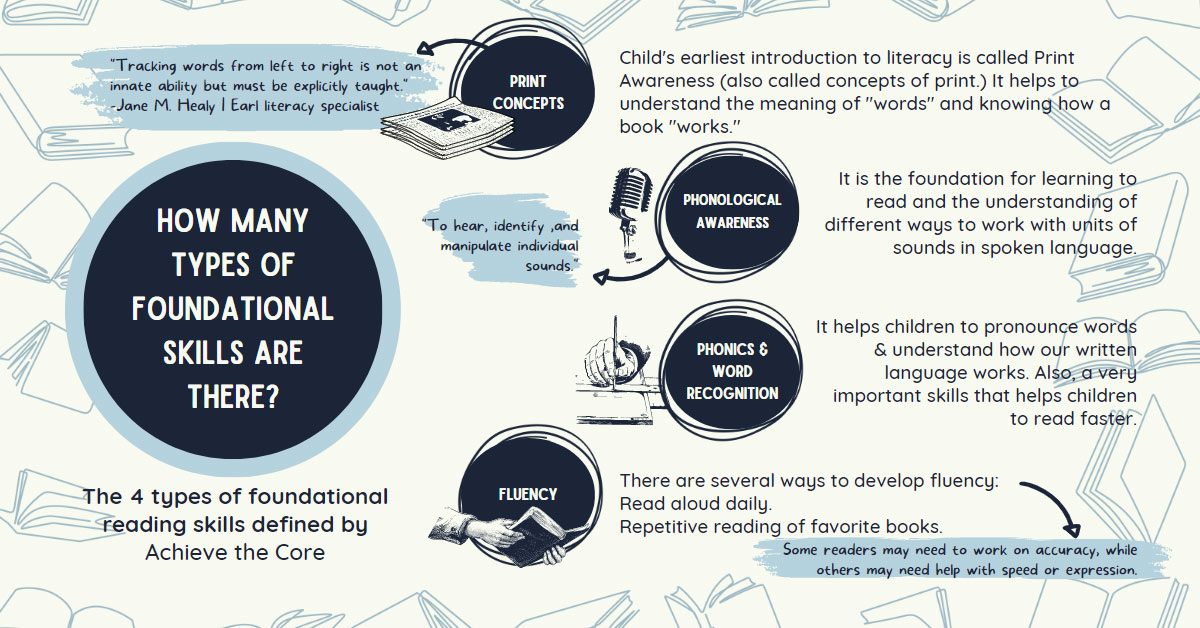
23 Dec A Simple Guide to Learning Foundational Reading Skills
GUIDE TO LEARNING FOUNDATIONAL READING SKILLS

A Simple Guide to Learning Foundational Reading Skills
What Are Foundational Skills?
According to act.org, foundational skills are the fundamental, portable skills essential to conveying and receiving information critical to training and workplace success. Therefore, foundational skills in reading are the basic building blocks that help children learn to read fluently and comprehensively.
How many types of foundational skills are there?
The 4 types of foundational reading skills defined by Achieve the Core are print concepts, phonological awareness, phonics and word recognition, and fluency.
Additionally, the National Reading Panel’s report suggests there are five components of effective reading instructions:
- Phonological awareness and phonemic awareness
- Phonics
- Fluency
- Vocabulary
- Comprehension
Vocabulary and comprehension are highly important for students in the third and fourth grades.
Now let’s go through all of the above one by one.

1. Print Concepts
Early literacy specialist Jane M. Healy explains that “tracking words from left to right is not an innate ability but must be explicitly taught.” She goes on to say that once children understand this concept, they can begin to decode words and read with fluency.
These skills might seem simple, but they are actually quite complex. These fall under the umbrella of print concepts or print awareness—the most basic foundational reading skills. Some examples of print concepts include the following:
- how to hold a book
- how to turn pages
- how to track words from left to right
It’s important to remember that kids cannot figure out print concepts on their own. We must teach them these foundational skills early on.
2. Phonological Awareness
Phonological awareness is the capacity to hear, identify, and manipulate individual sounds in spoken language. It develops in the early years of life and lays the foundation for phonics instruction in reading.
According to research, phonological awareness is a strong predictor of reading achievement. Children who are not phonologically aware often struggle with learning to read.
3. Phonics and Word Recognition
Phonics is the ability to read words by sounding out the letters. It is a very important skill because it helps children pronounce unknown words and understand how our written language works.
Word recognition is the ability to recognize words by sight. This is an equally important skill because it helps children read faster. When children can remember words quickly, they can spend more time understanding what they are reading instead of decoding the words.
These two skills are essential for all readers, but they are especially important for beginning readers.
4. Fluency
Fluency is a foundational skill for reading. It is the ability to read quickly, accurately, and with expression. A reader has gained fluency when he or she is able to understand the text’s overall meaning rather than individual words.
There are several ways to develop fluency:
- Read aloud daily. It can help build phonemic awareness, phonics skills, and recognition speed.
- Repetitive reading of favorite books. It allows readers to practice their skills and become more familiar with the text. When a child re-reads a book, they can find new connections, which can help improve their reading level.
Fluency instruction should be tailored to the needs of each reader. Some readers may need more work on accuracy, while others may need help with speed or expression.
5. Vocabulary and Reading Comprehension
Note: This starts in third grade and is more prioritized in students in third to fourth grades.
Reading comprehension is a foundational skill for success in school and life. The ability to read and understand text is critical for academic success. Good reading comprehension skills enable students to grasp challenging material.
Strong reading comprehension skills can help students better understand and remember what they read. A good vocabulary means making sense of new and known words and forming connections with the help of these semantics.

Parents’ role in helping children to improve their reading skills
Children learn best by example, so if they see their parents reading, they are more likely to read as well. You can assist your child in improving their reading abilities by engaging with them as much as possible.
For example, you could participate in reading books aloud with them. This will help them to practice pronunciation and fluency, as well as expand their vocabulary.
How teachers can help students in improving reading skills
As a teacher, you play a vital role in helping your students improve their reading skills. By providing them with the necessary tools and resources, you can help them overcome any challenges they may face.
Here are some tips on how you can help your students improve their reading skills:
1. Encourage them to read regularly. It’s easier said than done. But the trick is to set aside time each day for them to read. This could become a routine and eventually become a habit for them – whether before class or during lunchtime.
2. Help them find material that interests them. Try leading your students towards books, articles, or websites on topics they’re passionate about. Once they find something they enjoy reading, they’ll likely stick with it.
3. Guide them through difficult passages. Help students learn the meaning of new words.
Conclusion
All in all, it’s important to hire a professional tutor to develop foundational reading skills. The above are basic building blocks to help your child better understand the text.
Foundational literacy skills are best developed when they are taught with strategies that have worked before. At Themba Tutors, we consider every child’s individual needs. Reach out to us, and we’ll connect you with the right fit.
FAQs:
What is Phonological awareness?
Phonological awareness is an important skill for young children to develop to be successful readers. It is the ability to hear, identify, and manipulate the individual sounds in spoken words.
How can I help my child with phonemic awareness?
You can help your child learn to hear the different sounds in words. Read nursery rhymes and rhyming books together. Another good way is to play sound games where you can change one letter in the word to increase sound and letter awareness.
What activities promote phonemic awareness?
Reading aloud frequently and using rhyming poems can promote phonemic awareness.
What are the steps to phonemic awareness?
Breaking the word into its individual sounds is a good step for phonemic awareness. Teach your child about syllables and phonemes by focusing on each letter in the word.
Need help with learning foundation reading skills? Chat with Themba Tutors Today!
Our reading tutors and specialists are ready to help you right now!
We travel to the following locations: Manhattan, Brooklyn, Queens, Staten Island, Bronx, Long Island (Nassau & Suffolk Counties), Westchester County, Connecticut (CT),and New Jersey (NJ).
Free Consultation!!!
Call: (917) 382-8641, Text: (833) 565-2370
Email: [email protected]
(We respond to email right away!)
References:
Edweek: There are Four Foundational Reading Skills
https://www.edweek.org/teaching-learning/opinion-there-are-four-foundational-reading-skills-why-do-we-only-talk-about-phonics/2020/01
Achieve the Core: Foundational Skills (K-2)
Foundational Skills (K-2)- Achievethecore.orghttps://achievethecore.org › collection › foundational-s…
Reading Comprehension and Vocabulary: What’s the Connection?
https://readoxford.org/reading-comprehension-and-vocabulary-whats-the-connection
Phonics and Word Recognition
https://www.readingrockets.org/article/phonics-and-word-recognition-instruction-early-reading-programs-guidelines-children-reading
Craig Selinger
Latest posts by Craig Selinger (see all)
- Psychotherapy and Support Services at Cope With School NYC - April 12, 2024
- NYC Parents of Teens Support Group - April 8, 2024
- Here I Am, I Am Me: An Illustrated Guide to Mental Health - April 4, 2024

No Comments